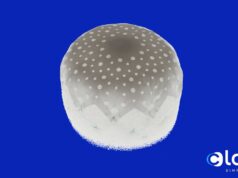
CeloNova BioSciences that its COBRA PzF nanocoated coronary stent (NCS) achieved exceptional long-term ischaemic safety of 0% definite and probable stent thrombosis (ST) and low ischaemia-driven target lesion revascularisation (ID-TLR) of 7.8% for its non-angiographic cohort at five years.
Results conclude the company’s global, multicentre PzF SHIELD IDE clinical trial of highly complex patients undergoing percutaneous coronary intervention (PCI). The study met its primary and secondary endpoints at nine months, demonstrating an excellent safety profile with 0% ST and low, 4.6% ID-TLR with a minimum of one-month DAPT therapy and was the basis for the stent’s US Food and Drug Administration (FDA) approval in 2017.
“It is truly remarkable to have a stent achieve complete protection from ischemic events with 0% definite and probable stent thrombosis at both the nine-month and five-year follow-up periods,” said Sigmund Silber, professor of medicine at practice in the ISAR Heart Center, Munich, Germany. “The results are particularly noteworthy given the highly complex nature of the patients who were studied. It offers valuable insight into COBRA’s performance as coronary artery disease progresses over time.”
A total of 296 patients with de novo coronary artery lesions from 35 centres across the USA and Europe received treatment with COBRA PzF NCS in the single-arm, non-randomised trial. The study’s population included elderly patients (66.5 average age) with comorbidities including diabetes (33.7%), atrial fibrillation (12.2%) and those with highly complex lesions (72% with type B2 or C lesions).
“These results reinforce the unique thromboresistant, anti-inflammatory and rapid healing properties of COBRA’s proprietary Polyzene-F coating, which has been consistently demonstrated in my pre-clinical research at CVPath since 2012,” stated Aloke Finn, medical director and chief scientific officer at CVPath and associate professor of medicine at the University of Maryland, College Park, USA. “The results of the SHIELD trial show that there is a unique advantage of the Polyzene-F coating in allowing a stent to heal quickly and in a functional way without the need for antiproliferative drug elution. I believe COBRA will continue to play an important role in delivering safety and efficacy in real-world clinical practice over time.”
Over 25,000 patients worldwide have been treated to date with COBRA PzF NCS. The novel stent has been extensively evaluated over the course of 10 years and 10 clinical trials in roughly 3,300 patients worldwide, consistently demonstrating excellent results with exceptionally low ST, low TLR and with short DAPT regimens in a real-world patient population, CeloNova says in a press release.
“We are extremely pleased that COBRA PzF NCS continues to strike the perfect balance between safety and efficacy and proud of its durable long-term clinical outcomes,” stated Carl St Bernard, president and chief executive officer of CeloNova. “We look forward to continuing to evaluate its performance with ultra-short DAPT in the highly underserved patient population at high risk for bleeding.”
COBRA PzF NCS is currently being evaluated with 14-days DAPT in high bleeding risk patients in the COBRA REDUCE clinical trial, described by CeloNova as the world’s first and only randomised, global 14-day DAPT study. The study’s six-month results, which were announced at TCT Connect 2020 (14–18 October, virtual), demonstrated 0.6% definite and probable ST with 14 days of DAPT with COBRA PzF NCS. The company anticipates release of the study’s 12-month results later this year.













